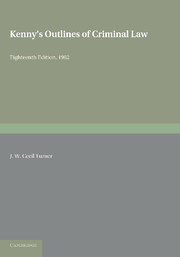Book contents
- Frontmatter
- Preface to the Sixteenth Edition
- Preface to The Seventeenth Edition
- Preface to the Eighteenth Edition
- Contents
- Index of cases
- Index to the principal statutes
- List of principal books cited
- BOOK I GENERAL CONSIDERATIONS
- BOOK II DEFINITIONS OF PARTICULAR CRIMES
- CHAPTER VII HOMICIDE
- CHAPTER VIII OFFENCES AGAINST THE PERSON THAT ARE NOT FATAL
- CHAPTER IX BIGAMY
- CHAPTER X CRIMINAL LIBEL
- CHAPTER XI OFFENCES AGAINST PROPERTY
- CHAPTER XII BURGLARY AND HOUSEBREAKING
- CHAPTER XIII STEALING
- CHAPTER XIV EMBEZZLEMENT
- CHAPTER XV FRAUDULENT CONVERSION
- CHAPTER XVI CHEATS PUNISHABLE AT COMMON LAW
- CHAPTER XVII FALSE PRETENCES
- CHAPTER XVIII RECEIVING STOLEN PROPERTY
- CHAPTER XIX OTHER OFFENCES INVOLVING FRAUD
- CHAPTER XX FORGERY
- CHAPTER XXI OFFENCES AGAINST THE STATE
- CHAPTER XXII CONSPIRACY AND INDUSTRIAL DISPUTES
- CHAPTER XXIII PERJURY AND OTHER OFFENCES AGAINST PUBLIC JUSTICE
- CHAPTER XXIV OFFENCES AGAINST INTERNATIONAL LAW
- CHAPTER XXV OFFENCES OF VAGRANCY
- BOOK III MODES OF JUDICIAL PROOF
- BOOK IV CRIMINAL PROCEDURE
- Appendix I The meaning of ‘credit’
- Appendix II II Rules as to admission of evidence which reveals to the jury facts discreditable to the person accused
- Appendix III III Forms of indictment
- Index
CHAPTER XX - FORGERY
from BOOK II - DEFINITIONS OF PARTICULAR CRIMES
Published online by Cambridge University Press: 05 June 2016
- Frontmatter
- Preface to the Sixteenth Edition
- Preface to The Seventeenth Edition
- Preface to the Eighteenth Edition
- Contents
- Index of cases
- Index to the principal statutes
- List of principal books cited
- BOOK I GENERAL CONSIDERATIONS
- BOOK II DEFINITIONS OF PARTICULAR CRIMES
- CHAPTER VII HOMICIDE
- CHAPTER VIII OFFENCES AGAINST THE PERSON THAT ARE NOT FATAL
- CHAPTER IX BIGAMY
- CHAPTER X CRIMINAL LIBEL
- CHAPTER XI OFFENCES AGAINST PROPERTY
- CHAPTER XII BURGLARY AND HOUSEBREAKING
- CHAPTER XIII STEALING
- CHAPTER XIV EMBEZZLEMENT
- CHAPTER XV FRAUDULENT CONVERSION
- CHAPTER XVI CHEATS PUNISHABLE AT COMMON LAW
- CHAPTER XVII FALSE PRETENCES
- CHAPTER XVIII RECEIVING STOLEN PROPERTY
- CHAPTER XIX OTHER OFFENCES INVOLVING FRAUD
- CHAPTER XX FORGERY
- CHAPTER XXI OFFENCES AGAINST THE STATE
- CHAPTER XXII CONSPIRACY AND INDUSTRIAL DISPUTES
- CHAPTER XXIII PERJURY AND OTHER OFFENCES AGAINST PUBLIC JUSTICE
- CHAPTER XXIV OFFENCES AGAINST INTERNATIONAL LAW
- CHAPTER XXV OFFENCES OF VAGRANCY
- BOOK III MODES OF JUDICIAL PROOF
- BOOK IV CRIMINAL PROCEDURE
- Appendix I The meaning of ‘credit’
- Appendix II II Rules as to admission of evidence which reveals to the jury facts discreditable to the person accused
- Appendix III III Forms of indictment
- Index
Summary
Section I. History
ROYAL SEALS AND CHARTERS FIRST PROTECTED
The verb ‘to forge’, which originally meant simply ‘to make’, acquired, even before the time of Shakespeare, the special sense of making deceitfully. Yet the crime of forging ordinary (as distinct from sealed, or official) writings is not very ancient in England. In this country the felony of forgery first appeared in connexion with the falsification of royal seals, and it was closely linked with coinage offences and with treason; it was indeed at first regarded as a species of treason. When, however, at an early period not only royal charters but also private charters came to be protected, forgery could be regarded as a distinct crime although it did not yet cover ordinary writings which were not under seal.
Unsealed writings of a private sort did not in those days create the important legal interests which the much later expansion of commerce has made common, so that there was little need for a wider law. At the beginning of the fifteenth century a statute gave a civil remedy to persons who had been defrauded through the falsification of deeds relating to real property. This law was extended in 1562; but still the protected writings had, in all cases save that of testaments, to be under seal. Coke made no allusion to a crime of forging ordinary writings, and Hale said nothing of the existence of forgery at common law either as a felony or a misdemeanour.
PROTECTION EXTENDED TO PRIVATE UNSEALED WRITINGS
The law of forgery as it is now understood seems indeed to have begun in 1727 when the judges, by a bold interpretation, declared that the use of the word ‘writings’ in the preamble of the above mentioned statute of Elizabeth covered the forging of a writing which was not sealed; and they stated that such a falsification was indictable as a forgery at common law, even before the enactment of Elizabeth. Yet, so much as fifty years later, Hawkins discussed the law of this matter in hesitating terms.
- Type
- Chapter
- Information
- Kenny's Outlines of Criminal Law , pp. 366 - 381Publisher: Cambridge University PressPrint publication year: 2013



